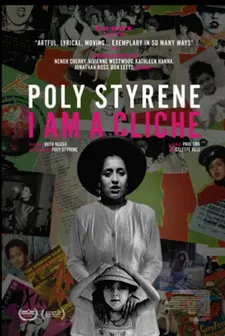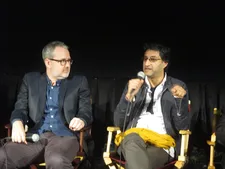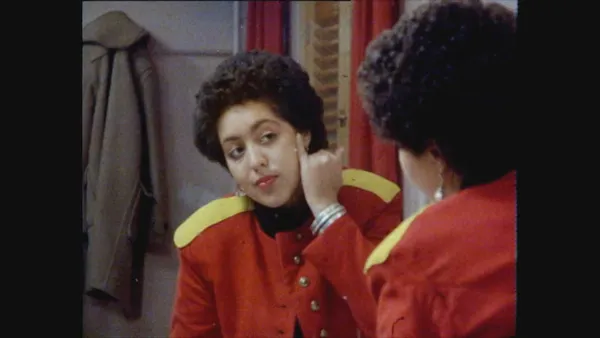Celeste Bell and Paul Sng’s Poly Styrene: I Am A Cliché (BIFA Best Independent Documentary and Discovery Award winner), co-written with Zoë Howe, with Poly voiced by Ruth Negga (Rebecca Hall’s Passing and Oscar nominated for Jeff Nichols’ Loving) features some of the most creative talent of the late Seventies, early Eighties London, including X-Ray Spex members Paul Dean and Lora Logic; Neneh Cherry, Don Letts, Pauline Black, Vivien Goldman, Ana Da Silva, Gina Birch, Thurston Moore, Youth, and Vivienne Westwood sharing their remembrances of Poly Styrene off-camera, while we see brilliantly chosen and socially relevant archival footage on the screen to set the tone. During my conversation with the filmmakers, 99 Records founder and music producer legend Ed Bahlman joined us briefly with his thoughts on that time, meeting Poly, and the great job they did with their film.
 |
| Paul Sng with Celeste Bell on two filmmakers who inspired the look of the film: “Julien Temple’s The Filth And The Fury, where he has the Sex Pistols in silhouette and Asif Kapadia’s films” |
From across the Atlantic, Celeste Bell and Paul Sng joined me on Zoom for an in-depth conversation on Poly Styrene: I Am A Cliché.
Anne-Katrin Titze: Most people at some point in their lives have to come to terms with the fact that their parents had a life before them, that not everything exists in relation to them. Your film in a very interesting way includes that part. Celeste, your mother has this looming legacy, so how were you balancing these different aspects that are equally important in the film?
Celeste Bell: Yeah, it’s a good question because definitely you could say that the starting point of the film is asking that question. How do you reconcile as an adult child that person as your parent with that person as an independent individual? It’s very hard for children to do that because we see our parents, as you say, very tied up with who we are as people.
When we’re small the parent is not just the caregiver, the parent is like the god of our universe. To separate that person who’s really cool with their own stories and backstories we may not know much about, I think that’s a lifelong process. I guess that’s becoming an adult, isn’t it?
AKT: Yes.
 |
| Celeste Bell on Ruth Negga as the voice of Poly Styrene: “She was able to reproduce my mother’s voice. It was really kind of …” Photo: Poly Doc Films Ltd |
CB: I think in the film we start off establishing this very important theme, because like many themes in this film, what we set out to do is address universal themes that we can all relate to, whether you’re a fan of X-Ray Spex, Poly Styrene, punk music or even interested in music at all, there are a lot of things that I hope can resonate with an audience.
AKT: I think it will. Paul, how did you get Ruth Negga involved?And for both of you, did you see Passing, Rebecca Hall’s latest film?
Paul Sng: Celeste should get the credit for Ruth Negga, she bumped into her in Soho and got chatting, hung out a bit. Ruth’s great, because not only is she a fantastic actor - I haven’t seen Passing yet, but it’s on my list - but she has some similarities in terms of her life experience with Poly and her background. So it was wonderful.
AKT: She is a wonderful narrator. How did you feel about it, the voice?
CB: Paul and I were together when she did the voiceover in the recording studio in Soho. We were both blown away by her professionalism and she’s just an absolute natural. She was able to reproduce my mother’s voice. It was really kind of …
AKT: Uncanny?
CB: Yeah, uncanny. And we needed that voice because of my voice. I’m not an actress, I have a very nasal, monotone kind of delivery. It’s good to have a real pro there, providing some voiceover. We definitely needed Ruth and we’re very grateful for her involvement.
 |
| Ed Bahlman with Anne-Katrin Titze on Poly Styrene: I Am A Cliché: “Really great job with the archival footage about New York.” |
In terms of Passing, I’m going to watch it, it’s on my list. I’m also a big fan of Rebecca Hall’s work. I’ve seen things she appeared in and know her background as well is really interesting. She’s also a biracial actress, there’s that interesting connection there with Rebecca Hall.
AKT: Henry Louis Gates has a program, Finding Your Roots, I don’t know if it’s shown in the UK. He’s a professor at Harvard and one of the recent episodes was featuring Rebecca Hall. The connection to the past, to ancestral voices also is part of your film. What I like so much is that it shows how the public persona is one thing, and the private is the other.
Who would have thought that Poly Styrene had a Laura Ashley phase? Many people will be very surprised. I would like to talk a bit about style. Her choices are so interesting, from the braces to the two-coloured hair ribbons. Is there a special meaning that she loved two colours in her hair?
CB: I think she was in those days, in the late Seventies, she was really into colors. It was at a time when in the punk scene it was very dark, very monochrome, a lot of black leather and studs. That whole aesthetic she set out really to do something different. Where most of the punks were in black, she was going for colour; clashing colours was really her thing.
I remember an anecdote from my grandmother who said that my mother would wear odd coloured socks, like a pink sock and a green sock. And my grandmother didn’t want to go outside with her, because she had two different coloured socks on. The clashing colours was very much part of her fashion identity at that time.
 |
| Poly Styrene: I Am A Cliché poster |
AKT: Her style is so individualistic and non-sexualized. The idea of lookism comes to mind. I had to think of Heather Widdows’s Perfect Me. Maya Singer wrote a beautiful article in Vogue last September about that. Your mother in a way already then was promoting something else, that you are allowed to have fun with the way you look, that it doesn’t have to be those strict formulas. Was that also something that attracted you, Paul?
PS: Yeah, definitely. Poly gets lumped in with all the other punks and she was a true punk. Because I think punk is about DIY culture. It’s about rebellion, it’s about resistance and resilience. And she just looked different and I think those kind of punks who just copied the first generation with the leather jackets and the mohawks are not true to the spirit of punk in the way Poly was. She wore bright colours, she was a fashion icon.
I mean today she’s a huge inspiration to punks of colour. Poly, I don’t know how you would define it, but in terms of being an icon, she is I suppose the godmother of all of this. She invented this stuff. It’s been wonderful in making the film to hear how much love there is for Poly and her music and her artistry but also for some of the fashion. I bet if she was here and be able to see this influence she’s had on the world, it’s just wonderful to see. It’s just so fresh and what we need in the times we’re going through which are quite bleak. Very little subtle things like bright colours do very important things.
AKT: One of the pivotal scenes in the film is when Don Letts talks about going to John Lydon’s apartment and Poly’s frustration of sitting there and being ignored and then her reaction of cutting off her hair. It’s always both, the outside and the inside that we have to deal with.
I do have a greeting for both of you from 99 Records founder and music producer Ed Bahlman, who knew your mother. He was introduced to Poly by Falcon Stuart in 1977 and was on the CBGB guest list for X-Ray Spex shows in 1978. His shop 99 - I don’t know if you are familiar with it - was also the first one in the US to have Germfree Adolescents [and Poly’s first solo Translucence]. He brought out the first record by Vivien Goldman. He is sending his greetings to you!
CB: Oh that’s lovely, please, send them back as well!
 |
| Praise for Vivien Goldman’s Dirty Washing 12” EP, produced with John Lydon and Adrian Sherwood on 99 Records Photo: Anne-Katrin Titze |
AKT: Do you want to say hello?
Ed Bahlman: Hi!
CB: Hi, Ed!
EB: Really great job with the archival footage about New York.
CB: Oh, thank you!
EB: I was right back in that time, it was amazing. The reason why I was at The Speakeasy was because a friend from New York was auditioning, a woman, to be in Rat Scabies’ new band, when he left The Damned. She was going to be the lead guitarist. So the performance for the audition was at The Speakeasy Club and to get in, all you had to do was show your US passport, because I wasn’t a member.
And word got out that there was somebody from New York and Falcon Stuart of course approached me and then introduced me to Poly. Ari Up was there and they wanted to see this new guitar player. I had seen Falcon’s film in New York before.
CB: Yeah.
EB: And then it all started. And I saw Poly’s first show after the hair cutting. Great job with the film!
CB &PS: Thank you!
AKT: Tell me about your decision to not have talking heads in the film! I think it works really well to just have the footage.
 |
| Oscar winners: Asif Kapadia (Amy) on the mike with Morgan Neville (20 Feet From Stardom) Photo: Anne-Katrin Titze |
PS: It’s exactly the reasons your friend [Ed] said, to immerse the audience into the period. Because it’s a story set across multiple time periods. The distraction of seeing Vivienne Westwood, Don Letts, in the present day, or anyone for that matter, would mean you’d be shifting. And if you got an immersive experience where you got an archive of a particular period and you’re hearing the human voice - the human voice doesn’t change that much over time - we’re able to transport our audience into these time periods.
Yeah, it was inspired by two people really, one was Asif Kapadia, who uses the approach of archive on films like Senna, [Diego] Maradona, Amy and then also by another punk film, Julien Temple’s The Filth And The Fury, where he has the Sex Pistols in silhouette. I was at a Q&A he was doing. Someone said why are they in silhouette? Was it because you’re trying to tell people that they’ve been witnesses to a crime? He said, no, it’s because they’re in their forties and nobody wants to see them. He was joking, but it stuck with me. Seeing people in the present day when it is about a story that happened a long time ago can work, but I think our approach was more immersive.
AKT: It definitely would distract from what they are saying! Thank you!
Poly Styrene: I Am A Cliché opens in cinemas and other venues across the US on February 2.






















